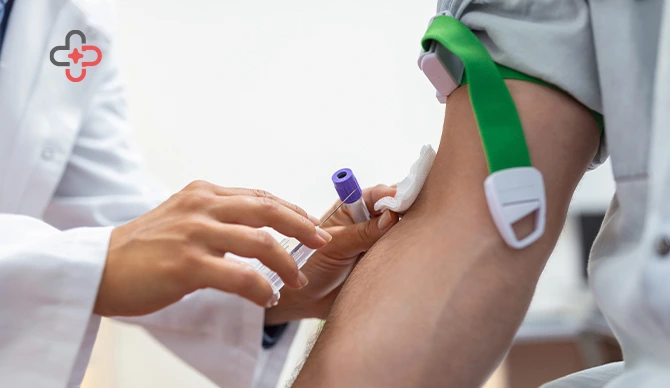You might feel perfectly fine, but that doesn’t mean everything is fine under the surface. A routine blood test from Manhattan Primary Care offers a simple yet powerful way to detect early signs of hidden issues like heart disease, diabetes, or thyroid problems, often before you notice symptoms, making it an essential step for anyone looking to stay proactive about their long-term health.
What Is a Routine Blood Test?
A routine blood test is a laboratory analysis of your blood that gives a snapshot of your overall health. You might also hear it called routine lab work or a blood screening test.
These tests look at a wide range of things, including results typically reviewed during annual physical & wellness exams:
- Organ function (like kidneys and liver)
- Infections
- Nutrient levels
- Blood cell health
- Hormone balance
- Inflammation
Routine blood tests can reveal underlying health issues before symptoms appear, giving you and your doctor the chance to intervene early and prevent serious complications—an essential part of preventive care.
What Does Blood Work Show?
People often ask, “What does a routine blood test show?” It checks key health markers like cholesterol, blood sugar, organ and thyroid function, and inflammation—spotting hidden issues before symptoms start.
- Cholesterol and triglycerides (via lipid panel)
- Blood sugar and A1C (for diabetes risk)
- Kidney and liver function (via a metabolic panel)
- Red and white blood cell counts (via CBC)
- Thyroid hormone levels (via a thyroid panel)
- Inflammation markers (like CRP and ESR)
Common conditions detected include:
- Anemia
- Infections
- Nutritional deficiencies
- Thyroid dysfunction
- Prediabetes and diabetes
- Signs of heart disease or metabolic syndrome
Abnormal blood work results can help flag these issues early, supporting better chronic disease management through timely intervention.
Types of Routine Blood Tests
Here’s a breakdown of the most common blood tests that show up in a full panel:
- CBC (Complete Blood Count): Measures red and white blood cells, hemoglobin, hematocrit, and platelets.
- CMP (Comprehensive Metabolic Panel): Checks liver enzymes, kidney function, glucose, calcium, and electrolytes.
- Lipid Panel: Assesses cholesterol levels (HDL, LDL, total cholesterol) and triglycerides.
- Thyroid Panel: Look at TSH, T3, and T4 to evaluate thyroid health.
- CRP and ESR: Detect inflammation in the body, which can be linked to heart disease, autoimmune conditions, and more.
- Vitamin and Mineral Levels: Especially B12, vitamin D, and iron levels.
Each test plays a unique role in painting a picture of your internal health, and can be helpful in identifying causes of common acute illness symptoms before they escalate.
What Routine Blood Test Can Be Detected Early?
Why wait for symptoms when you can catch issues early?
Routine lab work can reveal:
- Cardiovascular issues (like high cholesterol or chronic inflammation)
- Diabetes or prediabetes (through elevated glucose or A1C)
- Thyroid disorders (like hypothyroidism or hyperthyroidism)
- Liver or kidney dysfunction (often symptomless until advanced)
- Nutritional deficiencies (B12, iron, vitamin D)
- Autoimmune or inflammatory diseases
At Manhattan Primary Care, we believe early detection means faster action and better outcomes. Whether that means adjusting your diet, starting medication, or getting referred to a specialist, the sooner you know, the better your outcome.
When and Where to Get Blood Work Done?
With Manhattan Primary Care, getting your blood work done is easier than ever.
Here’s how you can stay on top of your health with our lab services:
- Primary care physician: Most routine blood tests are ordered during an annual physical.
- Visit our walk-in lab locations: No appointment necessary—just drop by when it’s convenient.
- Use our specialist-aligned services: If you’re being treated for thyroid, cardiovascular, or metabolic conditions, we work closely with specialists to provide targeted testing panels.
How often should you get blood work done?
- Annually, if you’re a healthy adult wanting to stay proactive.
- Every 3 to 6 months, if you have existing risk factors like diabetes, hypertension, or a family history of chronic illness.
With Manhattan Primary Care’s comprehensive blood screening services, you get fast turnaround times, accurate results, and access to essential health screenings that help you stay ahead of potential health concerns.
Need guidance? Our licensed team is here to help interpret your results and suggest next steps based on your unique health profile.
Final Thoughts
A routine blood test offers critical insights into your internal health, helping to uncover silent conditions and track how well your body is functioning—even before symptoms arise. At Manhattan Primary Care, we make it easy and convenient to get screened, interpret results, and act early. If it’s been a while since your last blood test, now is the perfect time to schedule one with our lab services and take a proactive step toward better long-term health.
Frequently Asked Questions
Does cancer show up in routine blood work?
Not directly—routine tests may show warning signs, but cancer needs specialized testing for diagnosis.
How long to fast before blood work?
Usually 8–12 hours; water is okay, but skip food and drinks unless your doctor says otherwise.
How long does blood work take?
The draw takes less than 10 minutes; results typically return within 24–48 hours.
Disclaimer
This blog is for informational & educational purposes only and does not intend to substitute any professional medical advice or consultation. For any health-related concerns, please consult with your physician, or call 911.
